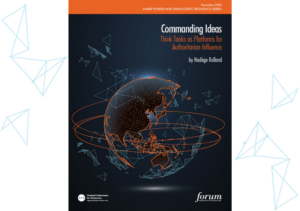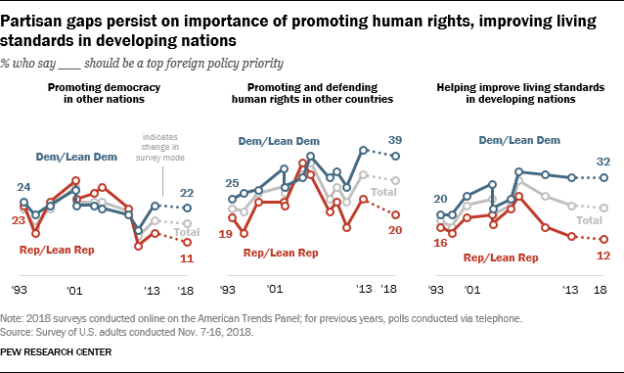 Should the United States prioritize democracy promotion over other foreign policy goals? A new analysis questions two assumptions: that the American people should support democracy promotion as a key foreign policy objective and that the United States has the capacity to successfully support democratization abroad.
Should the United States prioritize democracy promotion over other foreign policy goals? A new analysis questions two assumptions: that the American people should support democracy promotion as a key foreign policy objective and that the United States has the capacity to successfully support democratization abroad.
An analysis of these assumptions shows that the US practice of democracy promotion is inconsistent – and, at times, counterproductive, according to the Atlantic Council’s Mathew Burrows and Evan Cooper. They assess the successes and failures of efforts to advance democracy to make several recommendations, including:
- US democracy support should follow a ‘triage approach’, providing assistance to promising candidates for democratization, such as Indonesia, Tunisia, and Ukraine, and those on the precipice of democratic backsliding, while investing in civil society in authoritarian states where the focus should be on cultivating democratically inclined institutions.
- The US should leverage its assets while working with partners and allies to fight disinformation and support equitable economic growth and entrepreneurship, while exercising caution about relying too heavily on supporting elections and empowering foreign militaries.
- The US should focus its efforts and resources on the health of its own democracy in order to receive buy-in domestically and from foreign publics for democratization efforts.
 Several cases showed that smaller grants to local organizations are more effective than projects implemented by larger foreign-based civil society organizations. Pro-authoritarian movements have recognized this, leading them to fund local think tanks and advocacy organizations that compete with groups promoting democratic values, they add, citing a paper from the National Endowment for Democracy’s International Forum (Nadège Rolland, “Commanding Ideas: Think Tanks as Platforms for Authoritarian Influence,” National Endowment for Democracy, December 2020). RTWT
Several cases showed that smaller grants to local organizations are more effective than projects implemented by larger foreign-based civil society organizations. Pro-authoritarian movements have recognized this, leading them to fund local think tanks and advocacy organizations that compete with groups promoting democratic values, they add, citing a paper from the National Endowment for Democracy’s International Forum (Nadège Rolland, “Commanding Ideas: Think Tanks as Platforms for Authoritarian Influence,” National Endowment for Democracy, December 2020). RTWT
The study’s other words of wisdom – an election does not a democracy make and use military assistance with heavy caution – will seem like bromides to most democracy advocates and analysts, who would also query the authors’ own assumption – that the US or any other democratic government has ever prioritized advancing democracy over other strategic foreign policy imperatives.
Furthermore, successive studies confirm that while many US citizens may favor advancing democracy abroad, it is never an overriding priority. A 2018 Pew Research Center poll on foreign policy, found that 72% of Americans said taking measures to protect the US from terrorism should be a top priority followed by 71% who chose protecting the jobs of American workers. At the bottom of the list of 26 topics was promoting democracy in other nations.








